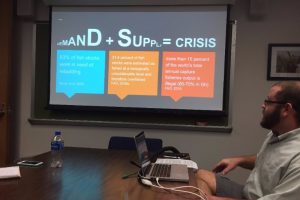Social Change and Development in Africa

Approximately 30% of shark and ray species are threatened worldwide, but Max and others want to know why this is happening. Max referenced past literature pointing to ecological (slow growth, late sexual maturity, long lifespan, mortality) and social (utilization of fins, oil, cartilage, skin, for pharmaceuticals and cosmetics) factors for the threatened status of sharks. After widespread popular media campaigns discouraging shark fishing, global catches of sharks, rays, and chimeras were recorded as decreasing throughout the early to mid 2000s. However there was an increase in shark fishing in Ghana during this time, especially in threatened species like hammerhead sharks. While the human population increased and consumption of fish stayed the same in Ghana, fish production decreased. This is particularly troubling as fish are an important source of protein for Ghanaians, and the fishing sector employs 10% of Ghana’s labor force.In his research project, Max followed the shark chain. He observed the practices that occur after sharks are caught including the sorting process, butchery, and trade. Max used information collected from his observations and interviews to construct a conceptual contextual framework for the shark chain from catching to selling. One of the project’s main goals was to use the mapped chain to inform decision making with the hopes that the chain could be improved. Max’s preliminary results showed that catches are declining, fishing livelihoods are becoming increasingly insufficient, laws and regulations on shark fishing are weak and rarely enforced, biodiversity of shark species is threatened, prices for shark fins are higher than they have been in recent history, and trade is dominated by foreign nationals.